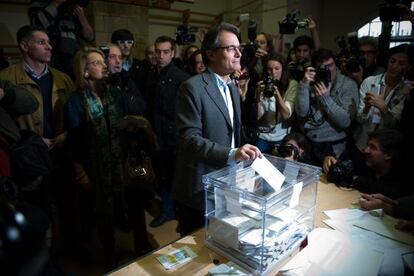Catalan premier Mas falls short of absolute majority for sovereignty plan
CiU leader says right-to-decide referendum process will still go ahead Leftist-nationalist ERC rises to second place

Catalan premier Artur Mas’ conservative nationalist CiU bloc failed to achieve his stated objective of an absolute majority in Sunday’s regional election. With all the votes counted, CiU was once again the winner of the ballot but saw its support fall from 38.4 percent of the popular vote in 2010 to 30.6 percent as a more fragmented Catalan parliament emerged after a high turnout of 69.6 percent.
Having called early elections, CiU saw its number of seats fall from 62 to 50 in the 135-member Catalan assembly as leftist nationalist parties improved their performance compared to two years ago. After 2010, the center-right CiU ruled with parliamentary support from the Prime Minister Mariano Rajoy’s Popular Party (PP) until tension arose between Mas and the Spanish leader over greater fiscal independence for the cash-strapped region.
Of the leftist nationalist groupings, the Republican ERC experienced a spectacular rise, almost doubling its support from seven percent in 2010 to 13.7 percent. The pro-independence party, led by Oriol Junqueras, is now the second biggest in parliament with 21 seats, up from 10, and pushing the PSC Catalan Socialists down into third on 20 seats, down from 28.
Unlike its former partner, the PP was not punished as CiU was, despite the stringent austerity measures applied in the region. The conservative force actually increased its share of the vote slightly to almost 13 percent and picked up one extra seat to reach 19.
Next came the ICV leftist grouping with 13 members in the new parliament, the anti-independence force Ciutadans up to nine seats from three, and the relatively unknown CUP, another leftist-nationalist force, making its debut in the regional assembly with three seats.
Speaking late on Sunday night, Mas admitted that the result was disappointing and that the situation was “not easy,” but he insisted that “process leading to the right to decide will go ahead,” in reference to the referendum on Catalan independence he intends to hold in the region during the new legislature.
Mas accused Rajoy of involvement in a plot hatched in the “sewers of the state”
In the closing week of the campaign, Mas faced allegations of corruption and money laundering stemming from an unofficial police report cited by El Mundo newspaper. Despite the fact that the report has not been included in any judicial investigation and that the UDEF financial crimes squad chief said last Thursday that his department knew nothing about it, senior government figures from the center-right PP have alluded to the allegations made by the newspaper and asked Mas to clear his name.
After Friday’s Cabinet meeting, Deputy Prime Minister Soraya Sáenz de Santamaría was asked about the unsigned draft police report insinuating that Mas and former Catalan premier Jordi Pujol have secret bank accounts in Switzerland where they reportedly deposited kickbacks-for-contracts money.
“The first thing that those who have overseas bank accounts must do is to declare them,” she said in reference to an element of the government’s anti-fraud campaign. Mas had accused Prime Minister Mariano Rajoy of involvement in a plot hatched in the “sewers of the state” to discredit him before Sunday’s ballot.
The Catalan premier called early elections after a September meeting with Rajoy in which Mas gained no ground in a bid for a new “fiscal pact” for Catalonia, which he claims gets a raw deal from central government in terms of funding flows. Despite the CiU’s traditionally cautious approach, Mas declared that if he gained a majority in the new parliament, he would call for a referendum in the region. The government in Madrid has made clear that any such plebiscite would be unconstitutional.
“These are the most decisive and significant elections in Catalonia’s history,” Mas said after voting in Barcelona.
Tu suscripción se está usando en otro dispositivo
¿Quieres añadir otro usuario a tu suscripción?
Si continúas leyendo en este dispositivo, no se podrá leer en el otro.
FlechaTu suscripción se está usando en otro dispositivo y solo puedes acceder a EL PAÍS desde un dispositivo a la vez.
Si quieres compartir tu cuenta, cambia tu suscripción a la modalidad Premium, así podrás añadir otro usuario. Cada uno accederá con su propia cuenta de email, lo que os permitirá personalizar vuestra experiencia en EL PAÍS.
¿Tienes una suscripción de empresa? Accede aquí para contratar más cuentas.
En el caso de no saber quién está usando tu cuenta, te recomendamos cambiar tu contraseña aquí.
Si decides continuar compartiendo tu cuenta, este mensaje se mostrará en tu dispositivo y en el de la otra persona que está usando tu cuenta de forma indefinida, afectando a tu experiencia de lectura. Puedes consultar aquí los términos y condiciones de la suscripción digital.








































